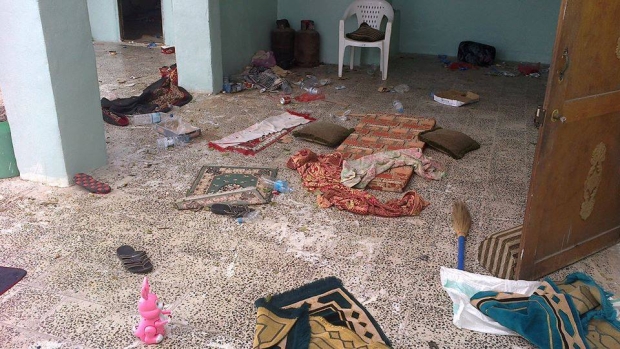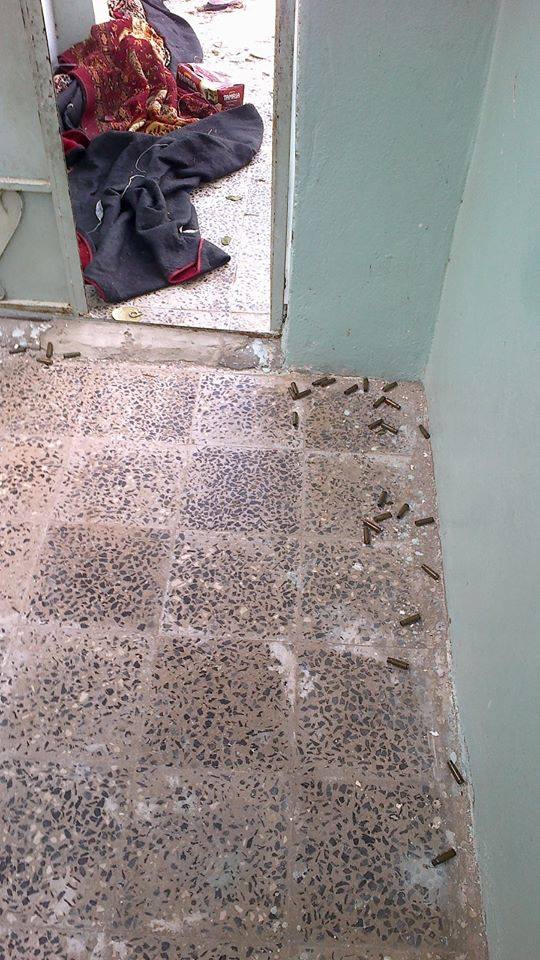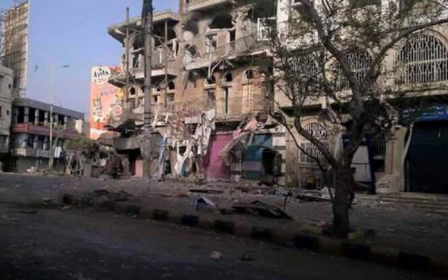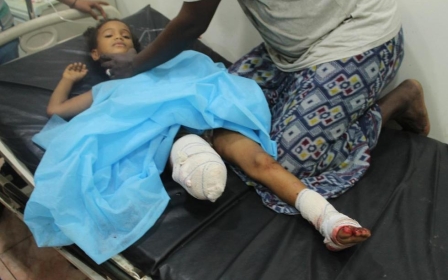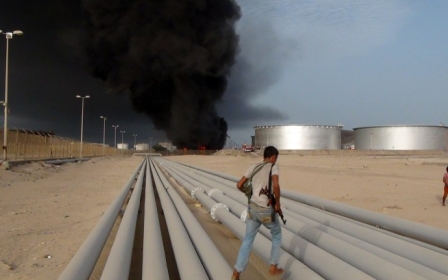In Yemen, no one to call for protection from repression
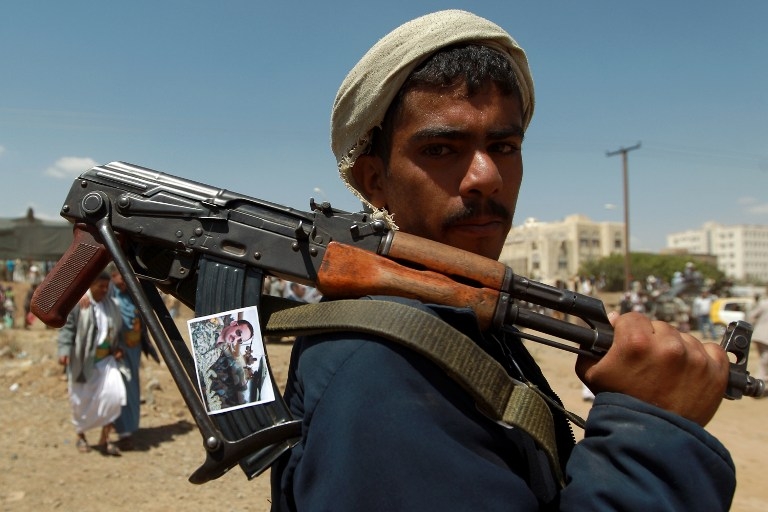
Mona and her family were reluctant to leave Sanaa at first. Despite the fighting, bombing and shelling, they resisted until they felt they could hold out no more.
Then last month - almost four months after the Saudi-led coalition began bombing Sanaa, and six months after the Houthi militias stormed the capital and placed many high-ranking politicians under house arrest - the family of four decided it was time to make a hasty retreat.
They packed their bags quickly and began what would be a 36-hour bus journey to Saudi Arabia’s Haradh border. With a multiple-entry US visa, Mona and her family were able to escape Sanaa but passage out of Saudi Arabia was not assured until they arrived in Riyadh.
When the Saudi-led bombing campaign started on 26 March, 24-year-old Mona said that she hoped things would soon turn around, but instead they went from bad to worse.
“We got kidnapping [threats] and death warnings from Houthis [who were targeting my] family members who were politically active on social media,” said Mona.
Mona says that her relatives have long been on the militias’ radar because her family has been politically prominent for generations and argues that the experience is part of a loose Houthi campaign to silence opposition and prevent a popular backlash against their supporters.
Before the bombing campaigns started on 26 March, journalists and activists were singled out by Houthi fighters as targets for kidnappings, threats, harassment and exile. Now, the violence has widened to include civilians who vocally decried militia rule - whether online or in the streets, she said.
“Regardless of whether or not people think that the Houthis are a legitimate ruling power, they get away with harassing anyone without any consequences,” she said from the US, where she now lives.
Mona saw her friends and family captured, detained unlawfully or imprisoned by the militia. Little was known of their whereabouts thereafter.
The exact numbers of civilians who have been traumatised by the militia since the start of the Saudi-led coalition airstrikes is unknown, but reports have been filtering out. More than 2,000 people have been killed in the fighting, and particular instances have stood out for specific rebuke by human rights groups.
In May, Human Rights Watch (HRW) reported that two women were shot and killed by Houthi militiamen in Aden. Citing the deaths as “possible war crimes,” HRW insisted all parties to the conflict should take feasible precautions to minimise harm to civilians. Despite claims from both sides that they were trying to do just that, the casualty count has continued to tick upwards.
Meanwhile, the Yemeni Journalists’ Syndicate (YJS) has registered no fewer than 67 cases of assaults towards journalists, but the true number is said to be higher.
Not all civilian activists opposing the militia rule have public profiles, explained, Abdulkader Alguneid, a physician and activist. This means that “when they are gone, they don’t get any mention, let alone attention”, he added.
The militias' “rule by terror” has expanded to include various targets, Alguneid told Middle East Eye. Alguneid cited two fellow doctors who were once vocal on social media, and have fallen silent after being detained by the militias. They were eventually released but now fear reprisals.
'In Yemen, a tweet is not harmless'
“I always had to choose my words carefully because I knew that in Yemen a tweet is not harmless,” said Mona.
“It is a strange situation since everyone is taught from a young age to call the police when you need help, but who do you call when you need help from the people in charge who are meant to protect you?” she asked.
Under President Ali Abdullah Saleh’s regime as well, civilians and journalists were constantly harassed and subjugated if they voiced their opinion against the government. At one point, under Saleh’s headship, the government issued a reward for the capture of Hussein al-Houthi, [founder of the Houthi movement] for orchestrating mass anti-government and anti-American demonstrations.
Historically, Alguneid said free speech in Yemen has been on a roller coaster since unification in 1990. Alguneid added that there was a huge leap forward with people daring to say whatever they wanted during the Arab Spring
“This is a strange situation,” he continued, pointing to the ongoing Houthi-Saleh coup. “The more they harass people expressing their views, the more people will denounce them.”
In Taiz, south of Sanaa, Alguneid said, people get abducted according to their online content. His friend Dr Abdullah Thaifani was kidnapped and later released for speaking out against the Houthis. “He’s over 60 and was abducted because the Houthi commander couldn't hit back at his resistance, so they took him.”
Ahmed, who would not give his real name for security reasons, said that he was in London when he got a call from his parents informing him that the Houthi militia had stormed into his building, and demanded to search his home in Sanaa. He was aware of a general threat against social activists, but did not fathom the danger would be on his door step so quickly.
Ahmed, who was on a visit to see his wife, has been stranded in London since March.
“I think some of Sanaa’s residents were mobilising forces against the militia presence in Sanaa since October last year. This made them obvious targets,” said Ahmed. The Houthis captured Sanaa in late September last year with unflinching ease, to the shock of many of Sanaa’s residents.
Ahmed was involved with the National Dialogue Conference since its inception in 2012, and fiercely supported Yemen’s uprising against former President Ali Abdullah Saleh that began in 2011. But four years on, he feels this very hope has descended into an irreversible chaos.
“It’s not difficult to track down civilians; Sanaa is a small place,” he said, nonchalantly. On the same day [8 April], Ahmed said, 300 activists and journalists were taken from their homes.
“What I think is they had names listed and they went to their homes, rounded them up and took them to prison,” he said. “Many are still in prison until today but some have been released.”
A close friend of Ahmed's, who showed solidarity online and tried to create awareness of the militias' criminality, was besieged and imprisoned. To date, Ahmed said he is unaware of his friend’s whereabouts.
Regardless of the harsh circumstances, some civilians can’t escape. Even so, Alguneid says he is undeterred. “I [couldn't] care less about the threats. I've decided right from the beginning to throw my name, my status, my education, anything I have behind the resistance. ”
Dodging militias
The Houthis have now been pushed out of the southern capital Aden but until recently their grip there was just as strong, local activists and journalists told MEE.
Wadid Maltoof, a young journalist for Aden TV and an activist, said that he felt “imprisoned”.
After the Saudi-led campaign began, militias overran the headquarters of Al Jazeera, al-Yaman Shabab (Yemen-Youth) and Yemen Digital Media. Two journalists were held hostage by the Houthis and were later killed in May in Dhamar, according to Reporters Without Borders.
Despite warnings and death threats from the militias, Aden TV continued its transmission of the militias' takeover of key districts in Aden after 2 April. The staff’s refusal to pay heed to the warnings infuriated the Houthis, who allegedly began to use spies to track down the local journalists.
At the start of May, the militias attacked the TV station. Maltoof severed the transmission cables before they took control of the building to prevent the Houthis from broadcasting.
Two days later, Houthi militiamen searched and obliterated Maltoof’s house and possessions. He started to feel insecure in the only place he had known all his life. At the time of attack he was not at home, but since then, he and his family have been forced to live like nomads.
“I would move from one house to another to dodge the militia, until I can get my family safely out of the country,” he said. With two children aged below three, he began to fear that the worst was yet to come. His pleas for assistance from the exiled government in Riyadh fell on deaf ears. He was in contact with the International Federation of Journalists [IFJ] and Reporters Without Borders, but did not receive any assistance for weeks.
Luckily though, the tide now seems to have begun to turn, at least in the south.
On Tuesday, Maltoof was reassured after Southern Resistance fighters recaptured Aden’s airport and central Aden’s district of Khormaksar on 17 July.
“I am overjoyed,” he said, while stressing his apprehension that the conflict could still intensify. “The infrastructure in Aden has been destroyed, it will be a long time before we sort our differences, and the country returns to normal,” he said.
Ahmed and his wife in London are keen to return, but cannot for the sake of Ahmed’s security until the political situation resolves. At the same time he, like Maltoof, is unconvinced the fighting is over.
“There should be a significant change on the ground if I have to think of going back. This can only happen if all areas are free from the militia rule. Right now, I don’t feel safe at all,” said Ahmed.
New MEE newsletter: Jerusalem Dispatch
Sign up to get the latest insights and analysis on Israel-Palestine, alongside Turkey Unpacked and other MEE newsletters
Middle East Eye delivers independent and unrivalled coverage and analysis of the Middle East, North Africa and beyond. To learn more about republishing this content and the associated fees, please fill out this form. More about MEE can be found here.


